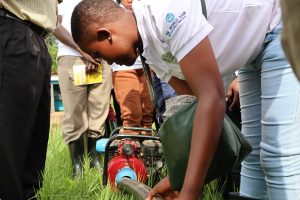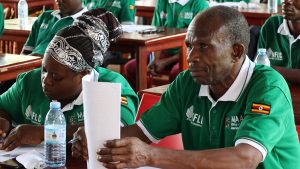“If knowledge is power then wisdom is wealth”, Mr. Lwakuba Alex Commissioner Crop Production Dept Representing PS/ MAAIF said as he flagged off Commercial Dairy and Maize farmers going for a Study Tour to Kenya as part of their hands-on Training conducted at NFLC- Kampiringisa and supported by FAO, under the Food Systems Transformation TCP on promoting Investments. He wished the team on behalf of the ministry to and from Kenya arguing for them to carry the Ugandan flag in being humble, social, and disciplined.

During his address, he conveyed greetings from the political leadership of the Ministry of Agriculture Animal Industry and Fisheries (MAAIF), specifically acknowledging the efforts of the Arg. Permanent Secretary in facilitating the training at NFLC.
He highlighted FAO’s crucial role as a dependable partner of MAAIF and expressed gratitude for their unwavering support to both the sector and the government. Reflecting sentiments echoed by the FAO Representative, he underscored Uganda’s gratitude to Providence for its food security. Additionally, he emphasized that peace and food security are fundamental markers of a mature and sovereign nation.
The MAAIF identified six key areas for sectoral development:
- Research, production, and multiplication of seeds,
- Pest, vector, and disease control,
- Mechanization and irrigation,
- Farmer education,
- Partnerships with commercial farmers, and
- Affirmative action for sustainable fisheries.
Aligning with government policies like the Agro-industrialization program, the ministry crafted the Agricultural Value Chain Development Strategy and the Food and Food Security approach to operationalize these goals. He stressed that FAO’s initiatives align with these government frameworks.
He emphasized the significance of the selected commercial farmers as champions of food systems transformation. After undergoing training by FAO and NFLC, he reminded them of the power acquired through knowledge, echoing Socrates’ adage. The tour aims to expose them to advanced practices and empower them to address socio-economic challenges, ultimately transforming the nation. The government expects them to extend their knowledge to other farmers in need.
“If there is any country in the world where Zero Hunger is possible, it is Uganda”, Dr. Antonio Querido (FAO Representative) remarkably noted. He wished the team a safe travel to Kenya.

During his address, he expressed gratitude to the National Farmers’ Leadership Centre (NFLC) for collaborating with FAO to achieve this significant milestone. He emphasized Uganda’s role as a vital food supplier in the region, highlighting its abundance of natural resources and potential to sustain not only Uganda and East Africa but also the entire continent. This study tour is an exposure opportunity, allowing participants to identify areas for improvement and explore new markets. Additionally, it facilitates the adoption of innovative technologies and fosters networking among farmers, promoting mutual support.
He underscored FAO’s pivotal role in providing technical guidance and managerial skills, encouraging participants to share their newfound knowledge with fellow farmers to amplify its impact. Traveling abroad presents an occasion to appreciate Uganda’s blessings, contrasting it with other climates. He praised the Ministry of Agriculture Animal Industry and Fisheries (MAAIF) for their collaboration with FAO, acknowledging FAO’s continuous support of MAAIF’s initiatives.
Upon the team’s return, he anticipates a debriefing session to capture their experiences and feedback, ensuring continuous improvement.

Mr. Okwaja John Bosco, accompanied by his team from the National Farmers’ Leadership Centre (NFLC), extended a warm welcome to all attendees and expressed gratitude to the FAO representative for the collaborative partnership between NFLC and FAO. He reiterated the recent training session held on February 16, 2024, where 50 participants underwent a week-long mindset training program, with 20 of them being chosen for a benchmarking activity in Kenya due to its advancements in dairy and maize value chains. These participants aim to gain insights into enhanced production techniques, market dynamics, and technological innovations, including value-addition processes.
Emphasizing three key objectives, Mr. Okwaja highlighted the importance of imparting knowledge on innovative practices and technologies in dairy and maize value chains, enhancing stakeholders’ understanding of food systems transformation for sustainable agriculture, and facilitating knowledge exchange and networking with Kenyan experts. He urged the team to remain open to learning opportunities regardless of their current level, emphasizing the potential for mutual learning and community sharing upon their return. Additionally, he informed the FAO representative that the selected participants are primarily large-scale farmers, aligning with the government’s focus, thereby offering learning opportunities for local/small-scale farmers.

He extended a warm welcome to everyone at FAO and later expressed best wishes for safe travels to and from Kenya. In his address, he emphasized the Technical Cooperation Programme’s (TCP) support for innovative initiatives like the Hana-in-Hand Initiative by facilitating investment throughout the value chain.
Agriculture is intricately linked from research to the final product on the table, encompassing inputs, production, processing, distribution, transportation, quality control, and marketing. This interconnectedness highlights the importance of integrated agricultural development, as neglecting one aspect can hinder overall progress. The TCP is pioneering this approach through value chain development. However, Uganda currently faces a significant challenge regarding the quality especially livestock products, emphasizing the crucial role of quality control. This presents an area ripe for innovation and exploration during the visit.





